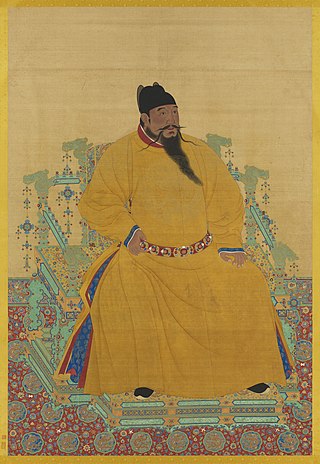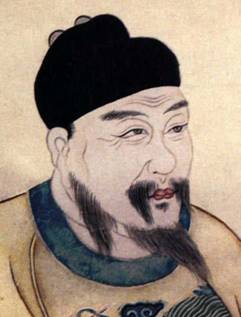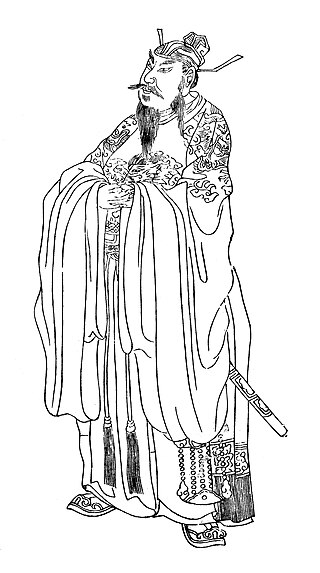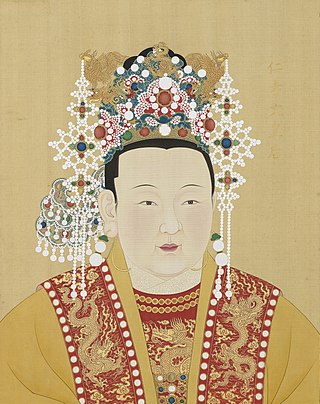
The Yongle Emperor, personal name Zhu Di, was the third Emperor of the Ming dynasty, reigning from 1402 to 1424.

The Hongwu Emperor, personal name Zhu Yuanzhang, courtesy name Guorui, was the founding emperor of the Ming dynasty of China, reigning from 1368 to 1398.

The Hongxi Emperor, personal name Zhu Gaochi (朱高熾), was the fourth Emperor of the Ming dynasty, reigned from 1424 to 1425. He succeeded his father, the Yongle Emperor, in 1424. His era name "Hongxi" means "vastly bright".

The Chenghua Emperor, personal name Zhu Jianshen, was the ninth Emperor of the Ming dynasty, who reigned from 1464 to 1487. His era name "Chenghua" means "accomplished change".

The Jiajing Emperor was the 12th Emperor of the Ming dynasty, reigning from 1521 to 1567. Born Zhu Houcong, he was the former Zhengde Emperor's cousin. His father, Zhu Youyuan (1476–1519), Prince of Xing, was the fourth son of the Chenghua Emperor and the eldest son of three sons born to the emperor's concubine, Lady Shao. The Jiajing Emperor's era name, "Jiajing", means "admirable tranquility".
Zhu Biao was the Hongwu Emperor's eldest son and crown prince of the Ming dynasty. His early death created a crisis in the dynasty's first succession that was resolved by the successful usurpation of his brother Zhu Di as the Yongle Emperor, an act with far-reaching consequences for the future of China.

Zhu Yujian, nickname Changshou (長壽), originally the Prince of Tang, later reigned as the Longwu Emperor of the Southern Ming from 18 August 1645, when he was enthroned in Fuzhou, to 6 October 1646, when he was captured and executed by a contingent of the Qing army. He was an eighth generation descendant of Zhu Jing, Prince Ding of Tang, who was the 23rd son of Ming founder Zhu Yuanzhang.

Xu Da (1332–1385), courtesy name Tiande, was a Chinese military general and politician who lived in the late Yuan dynasty and early Ming dynasty. He was a friend of the Hongwu Emperor, the founder and first ruler of the Ming dynasty, and assisted him in overthrowing the Mongol-led Yuan dynasty and establishing the Ming dynasty. He was also the father of Empress Xu, who married the third Ming ruler, the Yongle Emperor.

Empress Renxiaowen, of the Xu clan, was the empress consort to the Yongle Emperor and the third empress of China's Ming dynasty. She was well educated, compiling bibliographies of virtuous women, an activity connected with court politics.
Zhu Shuang was an imperial prince of the Chinese Ming dynasty. He was the second son of the Hongwu Emperor, the founder of the Ming. In May 1370, the Hongwu Emperor granted the title of Prince of Qin to him, with a princely fiefdom in Xi'an.

Empress Xiaocigao, commonly known as Empress Ma, was a Chinese empress consort of the Ming dynasty, married to the Hongwu Emperor and acting as his political adviser, exerting a large amount of influence during his reign.

The princes of the Ming dynasty were titled and salaried members of the imperial bureaucracy with nominal lordship over various fiefs of Ming China. All were members of the imperial Zhu clan descended from the twenty-six sons of Zhu Yuanzhang. None of the princes controlled the administration of their nominal fief, unlike some tribal leaders or Confucius' descendants, the Dukes of Overflowing Sagacity, who continued to rule their territories outside of the normal provincial system.
Prince of Jingjiang (靖江王) was a princely peerage created and used during the Ming dynasty. It was the tenth princely peerage created by the Hongwu Emperor; his grandnephew Zhu Shouqian was the first to be enfeoffed as Prince of Jingjiang. The Princedom of Jingjiang was distinct from other princely peerages in that the princely title contained two Chinese characters, common to second-rank princedoms but not first-rank princedoms. Nevertheless, the Prince of Jingjiang was still a first-rank princely peerage. The heir apparent to the Princedom of Jingjiang was styled Hereditary Prince, but the titles for other non-inheriting male members of the line was bulwark general or supporter general while female members were styled county lady or village lady, not commandery prince/princess as was common with other first-rank peerages.
Prince of Qi was a first-rank princely peerage of the Ming dynasty created by the Hongwu Emperor. The first Prince of Qi was Zhu Fu, 7th son of the Hongwu Emperor. He was made the principality by his father in 1370. The peerage later abolished by the Jianwen Emperor in 1399, and abolished again by the Yongle Emperor in 1406 after the re-creation of 1403. After Zhu Yujian enthroned as the Longwu Emperor of the Southern Ming, he posthumously restored Zhu Fu's princely title and princedom. The Chongzhen Emperor also posthumously bestowed 3rd son of his father, the Taichang Emperor, Zhu Youji (朱由楫) under the title of Prince of Qi.
Zhu Su, the Prince of Wu, later the Prince of Zhou (周王), was a prince of the Ming dynasty. He was the fifth son of the Hongwu Emperor and Empress Ma. He was assigned to Kaifeng in 1381.
Zhu Gui, initially known by his title as Prince of Yu, later changed to Prince of Dai (代王), was an imperial prince of the Chinese Ming dynasty. He was the 13th son of Hongwu Emperor with his concubine, Consort Hui.
Zhu Zhi, the Prince of Wei, later the Prince of Liao, was the 15th son of the Hongwu Emperor and Consort Han. He was ancestor of the last Ming prince to refuse to capitulate to the Qing, Zhu Shugui, Prince of Ningjing. Zhu Zhi's heirs used the generation names "Gui, Hao, En, Chong, Zhi, Yun, Reng, Qi, Bao, He, Xian, Shu, Yan, Zun, Ru, Cai, Han, Li, Long, Yu".
Zhu Mo was a prince of the Ming dynasty. He was the 21st son of the Hongwu Emperor. He was the granted the titile of Prince of Shen (瀋王).
Zhu Shizhen, born Zhu Wusi, was the father of Zhu Yuanzhang, the founder of the Ming dynasty.









